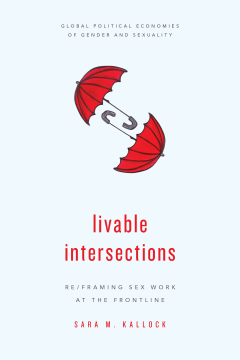
Additional Information
Book Details
Abstract
What is it like to live a life that is impossible? For many sex workers, life is lived at the crossroads of exclusion and assimilation, a crossroads where one is beset by vulnerability and regulation, where one is simultaneously blamed, victimized, and infantilized. Within this context of heteronormativity, sex working experiences are defined by multiple and overlapping forms of marginalization. Social support services are widely thought to provide a crucial bulwark against such unlivable realities by empowering service users to manage (and even overcome) their oppressive circumstances. Yet, such services are themselves often entangled with the social, cultural, and political processes that engender the disavowal of “sex” as a form of “work” and the attendant marginalization of sex workers. Bringing together insights from Judith Butler and intersectionality, Livable Intersections: Re/Framing Sex Work at the Frontline investigates the dynamics of frontline policy practice and in livability offers a new vision for designing, implementing, and valuing sex worker support services.
Kallock’s extensive research with service providers interrogates and critiques UK sex work policy at the frontline. This theoretically intriguing work reveals the challenges service projects face as they respond to sex workers’ needs under conditions of criminalization, economic exclusion, and stigmatization. In so doing, Livable Intersections starkly illuminates how policies restrict sex workers’ ability to both survive and flourish.
Samantha Majic, Associate Professor in Political Science, City University of New York
A wonderful, refreshing, engaging and important analysis and critique that does what it says it will do: re/frames the tired sex work debates and argues for a transformative, liveable ethico-political coalition of front line workers and sex workers towards a 'new ethos of sexual openness'.
Maggie O'Neill, Professor of Sociology, University College Cork, Ireland
Sara M. Kallock is Adjunct Professor at Saint Anselm College, USA.
This book offers insights to both the novice and rehearsed researcher as theoretical ideas stemming from the feminist ‘sex wars’ are broken down concisely, to offer a new perspective on understandings of sex work. Applying Butler’s concept of ‘livability’, this book offers an alternative, hopeful and fresh analysis of the possibilities in the relationship between sex workers and frontline professionals. Discourses are unpacked and boldly criticised as concepts like ‘partnership’ and ‘empowerment’ are dissected. Kallock destabilises mainstream thinking about the place of sex work in society, provoking critical engagement with traditional ideas and thinking how service delivery to sex workers can improve.
Teela Sanders, Professor of Criminology, University of Leicester
A complex and compelling empirical analysis of how radical social activism has been co-opted into the neoliberal agenda. Weaving together theories of livability, performativity, and agency, Kallock’s book is simultaneously sympathetic and damning in showing how frontline service providers reproduce the discursive and material frames that keep sex workers at the edge of political subjectivity.
Carisa Showden, Senior Lecturer in Sociology, University of Auckland
Table of Contents
| Section Title | Page | Action | Price |
|---|---|---|---|
| Cover | Cover | ||
| Livable Intersections | i | ||
| Series Page | ii | ||
| Livable Intersections: Re/Framing Sex Work at the Frontline | iii | ||
| Copyright Page | iv | ||
| Contents | v | ||
| List of Abbreviations | vii | ||
| Acknowledgments | ix | ||
| Epigraph | xi | ||
| 1 | 1 | ||
| “Where Everything Falls Down” | 1 | ||
| Definitions | 5 | ||
| Common Ground | 6 | ||
| Abolitionist Feminism | 7 | ||
| Sex Radicalism | 11 | ||
| Sex Laborism | 14 | ||
| A Note on Methodology | 18 | ||
| Chapter Synopses | 21 | ||
| Conclusion | 22 | ||
| 2 | 25 | ||
| Livability | 25 | ||
| Sex Puritanism | 26 | ||
| Identarian Recognition | 28 | ||
| Against Normalization | 30 | ||
| Livelihood | 36 | ||
| Agency | 39 | ||
| Conclusion | 42 | ||
| 3 | 45 | ||
| The Sex-Work Framescape | 45 | ||
| Trends of Respectability | 46 | ||
| Exclusionary Framing | 50 | ||
| Inclusionary Framing | 53 | ||
| Critical Liberation | 59 | ||
| Conclusion: Refusing Abjection | 66 | ||
| 4 | 69 | ||
| Positioning Projects | 69 | ||
| Funding | 72 | ||
| Performance Monitoring | 80 | ||
| Partnerships | 84 | ||
| Conclusion: Wriggle Room | 90 | ||
| 5 | 93 | ||
| Frames of Empowerment | 93 | ||
| Medical Model | 93 | ||
| Alternatives to the Medical Model | 94 | ||
| Practical Empowerment | 95 | ||
| Lifestyle Empowerment | 106 | ||
| Conclusion: Empowerment? | 115 | ||
| 6 | 117 | ||
| Framing Sex Work | 117 | ||
| The Deviant | 118 | ||
| The Negotiator | 125 | ||
| Flexing Frames | 130 | ||
| Conclusion: Re/Framing Sex Work | 136 | ||
| 7 | 139 | ||
| Reframing the Possible | 139 | ||
| Sex-Work Hegemony | 140 | ||
| Current Wriggling | 144 | ||
| Possible Wriggling | 146 | ||
| Toward Livability | 148 | ||
| chapter 2 | 151 | ||
| chapter 4 | 152 | ||
| Chapter 7 | 152 | ||
| Notes | 151 | ||
| Bibliography | 153 | ||
| Index | 163 | ||
| About the Author | 167 |
